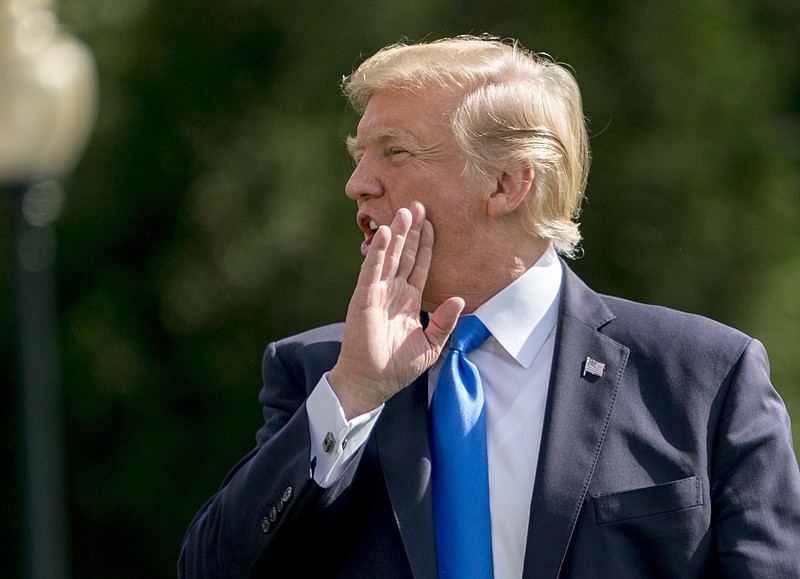If the 2016 presidential election just short of a year ago didn't convince us, a new Pew Research Center political typology study suggests we live "in a political landscape increasingly fractured by partisanship."
Not only that, but the study adds that "the divisions within the Republican and Democratic coalitions may be as important a factor in American politics as the divisions between them."
It's why you find political commentary - as we did on Friday - about the GOP "collapsing," the Democrats "trying to lose" and "both parties try[ing] harder and harder to defeat themselves."
"[T]he nation's capital political leaders were fighting a not-so-civil war" as "America went about business as usual," syndicated columnist Donald Lambro put it in The Washington Times.
On one side this week, Republican President Donald Trump was feuding with Sens. Bob Corker, R-Tenn., and Jeff Flake, R-Ariz., and on the other side evidence surfaced that Hillary Clinton's campaign and the Democratic National Committee helped fund the research that led to unsubstantiated claims about then-candidate Trump's ties to Russia.
It was a week that harked back to the question on the minds of many voters a year ago: Is this the best we've got?
And it's why the Pew study said only about as many respondents (37 percent) said life for people like them was better than it was 50 years ago as said it was worse (41 percent). The study further revealed that 48 percent said life for the next generation of Americans will be worse than life today, and only 28 percent thought it would be better.
In that case, perhaps it's better we all put on blinders and go about business as usual. Because the country's two main political parties seemed stuck on "destroy" mode - each other and themselves.
While the stock market soared to record highs and the economy defied expectations by growing 3 percent between July and September, Corker contended Trump was "debasing the country" and Flake termed the administration a "train wreck."
Meanwhile, the man presiding over that growth called a Democratic billionaire who said he'll spend $10 million to try to impeach the president "wacky & totally unhinged," battled with a Democratic congresswoman about a sympathy call to a dead soldier's widow and complained there was "no leadership in NFL" after players continued to kneel during the national anthem.
Democrats were united in their opposition to Trump, were as hopeful about stopping tax reform as they were health care reform, believed they could elect the first Democrat from Alabama in two decades and were confident they would keep the Virginia governorship.
However, they were eager to gloss over the results from the settlement of a multimillion-dollar lawsuit against the Obama-era Internal Revenue Service for targeting conservative organizations, the congressional investigation into Clinton's 2010 authorization of a sale of a uranium mining firm to Russia, the Alabama candidate's poisonous abortion-on-demand platform and a poll that showed Virginia's Democratic gubernatorial nominee now trailing in a race he had led from the start.
It's not surprising, then, that the Pew study found segments of the two parties differed from each other.
Republicans deviated on whether U.S. involvement in global markets is good for new markets and growth, whether immigrants burden the U.S. by taking jobs and housing, whether the U.S. economic system is generally fair to most Americans and whether homosexuality should be discouraged by society.
Democrats varied on whether hard work and determination are a guarantee of success for most people, whether government regulation of business is necessary to protect the public interest, whether the U.S. should pay less attention overseas and focus on problems at home, and whether it is necessary to believe in God to be moral and have good values.
You can see those thoughts echoed in intra-party differences.
Republicans, for instance, have different opinions on how to handle the millions of illegal immigrants in the country and how, if and when they might ever become citizens. Democrats are at odds on how much the government (and armies) should be involved in conflicts overseas when threats to the country are usually more implied than visible.
But if parties are unable to agree internally on policies and procedures and the way forward in this era of hyper-partisanship, how will the parties ever come together to get something done as a country? Will they end up as America's Shia and Sunni, the main Muslim sects that have been divided for some 1,400 years?
For a hopeful answer to those questions, we turn again to the Pew study, which finds that 77 percent of respondents believe freedom of choice in how to live one's life and 70 percent of respondents believe a good family life are essential components of the American Dream. Fortunately, we were founded on freedom and consider it sacred, and a good family life is within our grasp if we but work at it. Freedom and hard work - that's what built us, and that's what can keep us from splintering.
